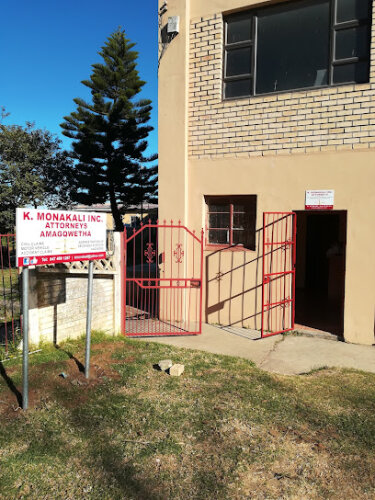Best Child Custody Lawyers in East London
Share your needs with us, get contacted by law firms.
Free. Takes 2 min.
Free Guide to Hiring a Family Lawyer
List of the best lawyers in East London, South Africa
South Africa Child Custody Legal Questions answered by Lawyers
Browse our 2 legal questions about Child Custody in South Africa and read the lawyer answers, or ask your own questions for free.
- Legal Gaurdianship Appointment
- I have a child who's been living with me for 3 months now. Social services have been at the child's house after school, reported/ logged a Form 22/23. Parents are struggling to take care of her and have agreed to appoint us as guardians for her. What do we need... Read more →
-
Lawyer answer by GAVEL & GREY LEGAL PRACTITIONERS
You will need the court approval on the legal guardianship.
Read full answer - Can a mother keep a caring father away from his child
- Can my mother of my child keep my child away from me
-
Lawyer answer by Attorneys
She cannot keep your child away from you unless there are valid reasons such as abuse.
Read full answer
About Child Custody Law in East London, South Africa
Child custody is a significant legal area in East London, South Africa, dealing with who is responsible for the care and upbringing of a child when parents are separated or divorced. The law aims to serve the best interests of the child, ensuring their emotional, financial, and physical well-being. Custody matters in East London fall under national legislation, mainly governed by the Children’s Act 38 of 2005, but they are adjudicated locally in the Magistrate's Court or Children's Court. East London, like other regions in South Africa, recognizes different forms of custody such as sole and joint custody, and also takes into account issues of visitation, parental rights, and responsibilities.
Why You May Need a Lawyer
Navigating child custody issues can be complex and emotionally taxing. You may need a lawyer if you are facing one or more of these situations:
- You and your partner cannot agree on who should have custody or how parenting responsibilities should be shared.
- There are concerns about the child's safety or well-being in one parent’s care.
- You wish to modify an existing custody agreement due to changing circumstances.
- There are disputes regarding visitation schedules or parental contact.
- You believe a parent may relocate with the child without proper consent.
- You are being accused of being an unfit parent and need to defend your rights.
- There are allegations of domestic abuse or substance misuse.
An experienced lawyer can help guide you through the legal process, ensure that your rights and the child’s best interests are protected, and represent you in negotiations or court proceedings.
Local Laws Overview
In East London, child custody is primarily governed by national South African law, particularly the Children’s Act 38 of 2005. Some key aspects relevant to East London include:
- Best Interests of the Child: All decisions are based on what will benefit the child most, considering their physical, emotional, and educational needs.
- Parental Rights and Responsibilities: Both parents usually have rights and responsibilities unless deemed unfit by the court.
- Types of Custody: Custody may be sole (one parent) or joint (shared between parents). There are also specific orders related to care, contact, guardianship, and maintenance.
- Unmarried Fathers: Unmarried fathers have rights, provided they contribute to the child’s upbringing and meet certain conditions under the law.
- Dispute Resolution: The law encourages mediation before litigation. Children’s Courts and local Family Advocates often assist with mediation and assessments.
- Protection Against Abuse: Courts will act swiftly if there are allegations of abuse or neglect.
- Modification of Orders: Custody arrangements can be changed if circumstances significantly change and the best interests of the child require it.
Frequently Asked Questions
What is the difference between custody and guardianship?
Custody refers to the care and residence arrangements of the child, while guardianship includes legal authority over matters like passports, schooling, and medical consent. Both can be shared or granted to one parent.
Who decides who gets custody of a child in East London?
Custody decisions are either agreed upon by parents (sometimes with the help of mediation) or determined by the East London Magistrate's Court or Children’s Court if there is a dispute, always considering the best interests of the child.
Is joint custody common in East London?
Yes, South African law increasingly favours joint parental involvement unless it is contrary to the best interests of the child due to abuse, neglect, or other serious concerns.
How does the court determine what is in the child's best interests?
The court considers factors such as the child’s age, preferences (if mature enough), relationships with both parents, each parent’s ability to care for the child, and the stability of the home environment.
Can a mother prevent a father from seeing his child?
Not without a court order. Both parents generally have rights unless contact poses a risk to the child. Courts can restrict access if there are valid concerns about the child’s safety.
What rights do unmarried fathers have?
Unmarried fathers can obtain parental rights and responsibilities if they contribute to the child’s upbringing and care, even if not married to the mother, depending on the child’s best interests.
How can a custody order be changed?
A custody order can be modified by applying to the court. The applicant must prove that significant circumstances have changed and that a new arrangement would be in the child’s best interests.
Is mediation mandatory before going to court?
While not always mandatory, courts and the Family Advocate’s office strongly encourage mediation to resolve disputes before litigation. This often helps parents reach a better agreement outside court.
What can I do if the other parent does not comply with a custody order?
You can lodge a complaint with the East London Magistrate's Court or seek enforcement assistance. Failure to comply with a court order is a legal offence and may attract penalties.
Can a child choose which parent to live with?
A child’s views are considered, especially if they are mature enough, but the final decision rests with the court based on what serves the child’s overall best interests.
Additional Resources
If you need more information or help, consider the following resources:
- East London Magistrate's Court: Handles most family and child custody matters locally.
- Family Advocate Office, East London: Provides advice, assessment, and assistance in negotiating parenting plans and resolving disputes.
- Department of Social Development: Offers social workers who can assess family situations and recommend solutions.
- South African Police Service (SAPS): Should be contacted if there are urgent protection needs, especially in cases of abuse or abduction.
- Legal Aid South Africa: Offers legal assistance for those who qualify financially.
- Independent Mediators and Family Law Attorneys: Numerous private professionals in East London can assist with mediation or legal advice.
Next Steps
If you require legal assistance with a child custody matter in East London, consider these steps:
- Assess Your Situation: Consider what issues you face and gather relevant documents (birth certificates, court orders, communication with the other parent, etc.).
- Seek Information and Guidance: Contact the Family Advocate for advice or approach a qualified family lawyer in East London for a consultation.
- Attempt Mediation: Try to resolve disputes through mediation, which is often faster and less stressful than court proceedings.
- Prepare for Court: If you cannot resolve the issue amicably, prepare to file an application in the Magistrate’s or Children’s Court. Enlist legal representation to guide and represent you.
- Protect Your Child’s Well-being: Ensure the child’s needs and daily routine are prioritized during the process.
- Follow Legal Orders: Adhere to any court orders and seek legal advice immediately if there are problems with compliance or if changes are needed.
Remember, every family situation is unique. Seeking professional legal advice is often the best way to ensure your rights and your child’s well-being are properly protected.
Lawzana helps you find the best lawyers and law firms in East London through a curated and pre-screened list of qualified legal professionals. Our platform offers rankings and detailed profiles of attorneys and law firms, allowing you to compare based on practice areas, including Child Custody, experience, and client feedback.
Each profile includes a description of the firm's areas of practice, client reviews, team members and partners, year of establishment, spoken languages, office locations, contact information, social media presence, and any published articles or resources. Most firms on our platform speak English and are experienced in both local and international legal matters.
Get a quote from top-rated law firms in East London, South Africa — quickly, securely, and without unnecessary hassle.
Disclaimer:
The information provided on this page is for general informational purposes only and does not constitute legal advice. While we strive to ensure the accuracy and relevance of the content, legal information may change over time, and interpretations of the law can vary. You should always consult with a qualified legal professional for advice specific to your situation.
We disclaim all liability for actions taken or not taken based on the content of this page. If you believe any information is incorrect or outdated, please contact us, and we will review and update it where appropriate.












